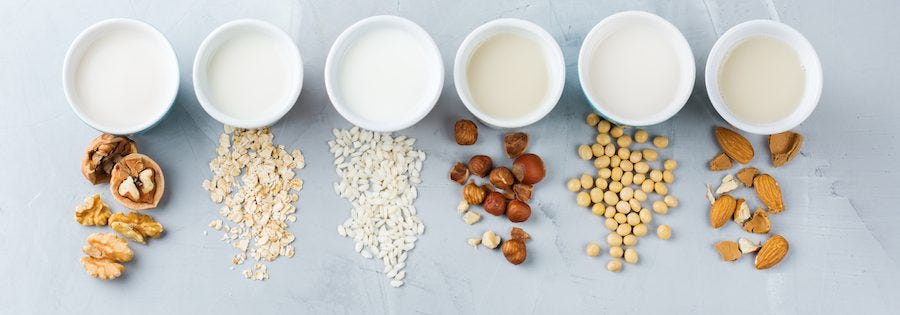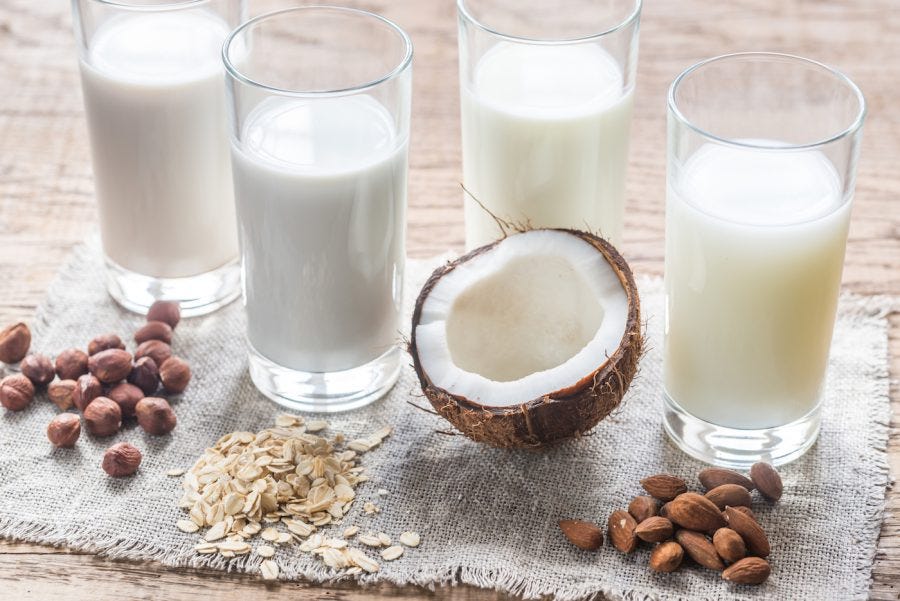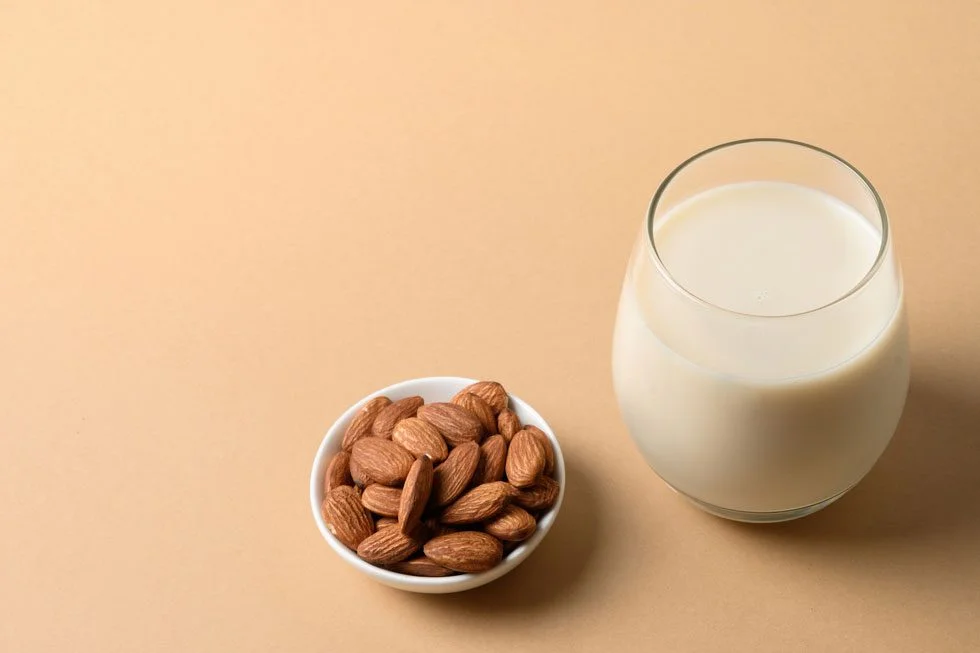What Are the Best Types of Plant-Based Milk?
We all know that milk is good for building strong bones and teeth, right? The dairy industry has gone to great lengths to convey that message, especially to parents concerned for the health of their children.
But is the ever-expanding selection of milk alternatives in the dairy section proof that cow’s milk is unhealthy? And, are non-dairy options, like soymilk, any better?
Let’s take a closer look…
The Trouble with Milk
Despite being high in protein and important vitamins and minerals – like the B vitamins, calcium, and phosphorous – cow’s milk also carries a unique sugar called lactose. Beginning as early as 1 year of age, fewer than 1 in 3 humans produce sufficient amounts of the enzyme lactase, which is needed to break down lactose and properly digest milk.
Without enough lactase in your gut, lactose remains undigested and becomes fermented by bacteria in your intestines, resulting in an array of gastrointestinal issues that are commonly referred to as lactose intolerance. But even if your body can break down lactose, it’s converted to galactose and glucose, which elevate blood sugar and can cause an unhealthy inflammatory response.
Milk also carries a protein called casein, which has gluten-type properties. Casein is an excitotoxin in the brain that can cause problems for many people, even if they aren’t lactose intolerant. When left unchecked, excitotoxins can lead to brain inflammation and neurodegenerative issues.
Some other milk proteins have a high potential to cause allergic reactions. By some estimates, 2-3% of kids under the age of three are allergic to cow’s milk.
Many people avoid milk because it contains animal products. Others are concerned about possible contaminants like antibiotics, hormones, or pesticides. All are valid reasons to move on from cow’s milk and seek out a healthier alternative.
Unfortunately, that search often leads to soymilk.
The Trouble with Soy
Soymilk comes from soybeans or soy protein isolate. It’s typically thickened with vegetable oils to enhance taste and give it a creamy consistency.
Soy is often marketed as the miracle food that can replace dairy. This is grossly inaccurate. In truth, unfermented soy can contain substances harmful to your health, including:
- A high concentration of lectins which are carbohydrate-binding proteins that can damage the cellular lining of the intestines and contribute to leaky gut, poor absorption of nutrients (including other proteins), and the death of intestinal cells
- Anti-proteases, proteins which block the body’s protein-digesting enzymes
- Condensed tannins, which reduce the overall digestibility of soy proteins
- Large amounts of omega-6 fatty acids, which in excessive amounts can lead to systemic inflammation
- A substantial amount of phytic acid, which is believed to reduce intestinal absorption of vital minerals
These various antinutritional soy factors can contribute to long-term health problems. For all these reasons, it’s best to look elsewhere for a replacement for cow’s milk.
4 Healthy Plant-Based Milk Options You’ll Go Nuts Over

1. Almond Milk
Almond milk has a smooth texture and a mild, nutty flavor. It’s often added to coffee, teas, and smoothies or used in desserts, baked goods, or in a bowl of cereal. Though almond milk is low in protein and fiber (due to the removal of the outer skin), it’s also low in calories and fat and is a natural source of vitamin E.
2. Cashew Milk
Made from whole cashews or cashew butter, cashew milk has a sweet, creamy, and nutty taste, which makes it ideal for thickening smoothies and as a coffee creamer/sweetener. It’s low in carbohydrates and sugar and has less than one third the calories of cow’s milk. Unfortunately, cashew milk is relatively low in protein.
3. Coconut Milk
Though it’s in the name, coconuts can only broadly be considered a nut (botanically speaking, they’re a fibrous, one-seeded drupe). Coconut milk has one-third the calories and half the fat of cow’s milk, but also has less protein. Coconut milk contains medium-chain triglycerides (MCTs), which may aid in weight loss, help reduce high cholesterol, and stoke the metabolism.
4. Macadamia Milk
Fairly new to the market, most of the nuts in this milk (which only make up 3% of the beverage, the rest is water) come from Australia. Macadamia milk is creamier and richer than many other non-dairy milks and is perfect for coffee or smoothies. Though lower in protein than cow’s milk, macadamia milk has about half the fat and is a rich source of monosaturated fats, which may help regulate blood cholesterol levels.

Other Plant-Based Milk
If you have a nut allergy, you might want to try one of these other plant-based milk options.
Oat Milk
Oat milk is made from, you guessed it, oats. It’s high in total fiber as well as beta-glucan, a soluble fiber that helps to lower cholesterol (particularly LDL cholesterol) in the body. Unfortunately, some manufacturers add ingredients like salt, oils, and gums to their products to improve their taste and texture.
Rice Milk
Rice milk comes from white or brown rice and water. Like oat milk, rice milk contains added ingredients to enhance its flavor and consistency. Rice milk is the least allergenic of non-dairy milk, but has twice the carbohydrates as cow’s milk, and contains high levels of inorganic arsenic.
Lesser known is hemp milk (though derived from the hemp plant, hemp milk only contains trace amounts of THC), and quinoa milk, which is made from the seed of the gluten-free quinoa grain.
For those seeking non-dairy options, there are many types of plant-based milk to choose from, with more being added all the time. Whether necessitated by health decisions or just a desire to switch things up, these are just a few alternatives to cow’s milk you can use in your foods, beverages, and smoothies.
Try one of the milk varieties above and let us know what you think below.
At BrainMD, we’re dedicated to providing the highest purity nutrients to improve your physical health and overall well-being. For more information about our full list of brain healthy supplements, please visit us at BrainMD.
- This Is What You Need to Know About the Standard American Diet! -
- What Are the Pros and Cons of Western vs. Eastern Medicine? -
- Why Experts Say You Should Take Vitamin C, Vitamin D3 and Zinc -
- These Are Some of the Best Natural Herbs for Energy -
- What Are the Top Health Benefits and Types of Saunas? -

